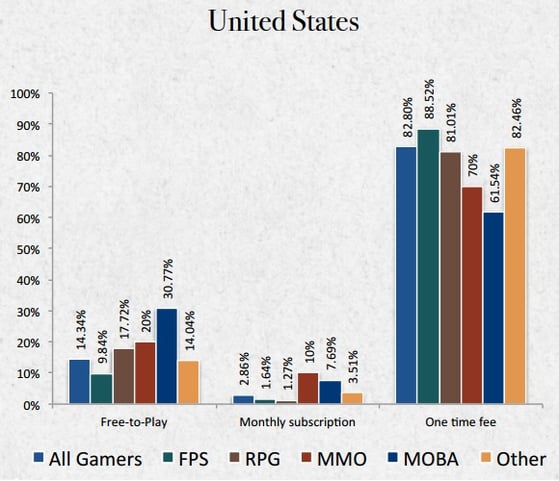Trending
Opinion: How will Project 2025 impact game developers?
The Heritage Foundation's manifesto for the possible next administration could do great harm to many, including large portions of the game development community.

Featured Blog | This community-written post highlights the best of what the game industry has to offer. Read more like it on the Game Developer Blogs or learn how to Submit Your Own Blog Post
Despite the industry’s focus on esports, alternative pricing models, and new ways to experience content, gamers still prefer games with a single, upfront cost. Find out why devs are backing away from Free-to-Play.

In Red Fox Insights' recent report, Exploring the Esport Gamer, our research identified the playing, viewing, and purchasing habits of gamers across the US and UK. One highlight of the report were findings around player perceptions of Free-to-Play games.
In measuring pricing model preference, we found that 82% percent of US audiences, and 87% of UK audiences preferred games with a one time fee. Despite the industry’s focus on esports, alternative pricing models, and new ways to experience content, gamers still prefer games with a single upfront cost.
Which pricing model do gamers prefer?

Free-to-Play games have established themselves as a viable platform for esports success, a means of fan engagement, and a source of revenue for developers. Some of today’s biggest games have embraced Free-to-Play models and found huge success. Games like League of Legends, Smite, World of Tanks, and Hearthstone draw massive audiences, generate huge partnerships, and have reshaped esports and gaming landscapes.
Even still, the majority of gamers prefer non Free-to-Play models, and major developers have taken notice.
One of this year’s biggest releases and esports next breakout hit, Overwatch, has stumbled through an exploratory phase involving pricing. This exploratory phase ended when principal Overwatch designer, Scott Mercer, addressed Overwatch's pricing during BlizzCon:
"From the beginning, we knew this was a game all about heroes. As we continued to work on it and add more heroes to it, hero-switching became a really key component. To really provide for a breadth of heroes to allow for that switching - to let people look at the other team and say, ‘OK, let’s change our lineup a little bit’ - became core to Overwatch. To support that, we need to have our 21 heroes [available for everyone]."
Thus the team adopted a one time fee, allowing gamers access to all available characters at launch - effectively supporting “hero-switching”. 
Thrusting Overwatch into the historically lukewarm reception of “multiplayer only, premium priced FPS” was a risk. Scott and the Blizzard team took this move seriously. Referencing other premium priced FPS, Scott noted “It’s something we have to consider, but we’re also a different game. We’ll look at all the data. We’ll look at feedback from the community. We’ll ask ourselves some hard questions, and then after launch we’ll figure out what’s the right thing for Overwatch.”
Overwatch isn't the only game that has faced pricing model challenges. Fellow “hero-shooter” LawBreakers is multiplayer only and was revealed as a free-to-play. However, founder of Boss Key Productions, Cliff Bleszinski announced pricing changes to LawBreakers while at GDC 2016:
"We did a lot of discussions and even more research. There are some core free-to-play games that do well, but for us, we didn’t want to go down the well of players buying 'energy' or other sleazy things. A lot of core gamers have a negative reaction when they hear free-to-play because they think they’ll get ripped off."
 This perception and research aligns with Red Fox Insights' discoveries. Players seem hesitant to latch onto free-to-play games for fear content and progress will be locked firmly behind pay walls. As a result, Boss Key re-branded LawBreakers as a "digital premium title" instead of free-to-play.
This perception and research aligns with Red Fox Insights' discoveries. Players seem hesitant to latch onto free-to-play games for fear content and progress will be locked firmly behind pay walls. As a result, Boss Key re-branded LawBreakers as a "digital premium title" instead of free-to-play.
Red Fox Insights segmented the results of our pricing model research by several factors - one of which was genre preference. In the US, players who prefer FPS, prefer one time fee pricing models more than any other genre. This lends credibility to decisions being made by Overwatch and LawBreakers, to deviate from free-to-play models in favor of upfront purchases.
Note that compared to the sample population, MMO fans have a greater preference for monthly subscriptions, while MOBA fans have a greater preference for free-to-play games.
Preferred Pricing Model: Segmented by Genre Preference (US)

Another recent title making the switch from free-to-play to premium is publisher Trion Worlds' Atlas Reactor. Gamesindustry.biz reports  how it's not unusual for a game to transition from a subscription or a premium price model, to free-to-play. It's more rare to see a game going the other way; swapping from free-to-play to a single point of sale.
how it's not unusual for a game to transition from a subscription or a premium price model, to free-to-play. It's more rare to see a game going the other way; swapping from free-to-play to a single point of sale.
CEO of Trion Worlds, Scott Hartsman, spoke about why switching from free-to-play, to a one time fee made sense for the tactical game, Atlas Reactor:
"We started looking at the data from the alpha, the data from the beta, and a lot of people's feedback was generally around the idea that they really just wanted to be able to just pick up the game and have all the options open to them - in our case that means all of the characters, all the freelancers. When we think about that as game designers we go, 'well, if more people have more access to more ways to play it actually makes for better games and much better match ups. And so it seemed really like a win-win from both their point of view and ours."
Scott continues, “For us, it's about applying the logic of what customers want, what fits the game, what fits the strengths of the people making the game.”
Free-to-play suits many games and certain audiences appreciate the “no barriers to entry approach.” Even Blizzard's own Hearthstone appears naturally suited for free-to-play, where purchasing additional booster packs to enhance a deck is an idea mirrored by real-world card collecting.
However, more devs are backing away from Free-to-Play in order to give audiences full game content up front. For more research exploring the esports gamer, genre preference and purchasing habits check out Red Fox Insights report on Exploring the Esports Gamer.
Read more about:
Featured BlogsYou May Also Like